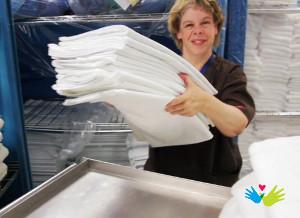 Williams Syndrome (WS) affects an estimated 20,000 to 30,000 people in the United States. Families of affected individuals encounter major struggles. Many babies have life-threatening cardiovascular problems. Children with WS need costly and ongoing medical care and early interventions (such as speech, physical and occupational therapy) that may not be covered by insurance or state funding. As they grow, they struggle with things like spatial relations, numbers and abstract reasoning, which can make daily tasks a challenge. The majority of adults with WS need supportive housing to live to their fullest potential, and few are able to work a “full-time” job or earn a large enough salary to be self-sustaining.
Williams Syndrome (WS) affects an estimated 20,000 to 30,000 people in the United States. Families of affected individuals encounter major struggles. Many babies have life-threatening cardiovascular problems. Children with WS need costly and ongoing medical care and early interventions (such as speech, physical and occupational therapy) that may not be covered by insurance or state funding. As they grow, they struggle with things like spatial relations, numbers and abstract reasoning, which can make daily tasks a challenge. The majority of adults with WS need supportive housing to live to their fullest potential, and few are able to work a “full-time” job or earn a large enough salary to be self-sustaining.
But unlike many disorders that can make connecting with your child difficult, individuals with WS tend to be social, friendly and endearing. Parents often say the joy and perspective a child with WS brings into their lives had been unimaginable, and their special personalities and perseverance help make dreams come true. Many adults with WS contribute to their communities as volunteers or work at senior homes and libraries or as store greeters or veterinary aides – no matter what they are doing, they seem to make a special impact.
Amy Koch, age 46 was featured in KLRU-TV’s “Women and Girls Lead” series in Austin, TX, a multi-year, public media initiative to “focus, educate and connect citizens worldwide in support of the issues facing women and girls.” Amy is a graduate of Project SEARCH, a best practice for hiring individuals with developmental disabilities created at Cincinnati Children’s Hospital and Medical Center. Amy’s lessons for all of us, “be proud of who you are” and “don’t let people stop you from trying,” are lessons that she lives each day in her job as a floor supply specialist at Seton Medical Center.
Leah Ward and North Carolina Central University head basketball coach LeVelle Moton, have a special friendship. Moton explains, “Ward isn’t shy with her enthusiasm for the Eagles.” And the coach has even called on Leah to deliver the pregame speech before game: “Do your best out there. Have fun and I know the game will be good!” Leah’s enthusiasm is working; the Eagles are 19 – 8 this season!
Ben (Big Red) Monkaba, age 27 had a lifelong dream to become a Shrine Clown. Ben has undergone multiple cardiovascular and spine surgeries, and he knows how important genuine smiles and a few laughs can be to a child in the hospital. Ben’s dream came true recently when he was able to spend a full day clowning with the Melha Shrine Clowns in Springfield, MA. Following the event, Shriner Craig (Doc) Kazin posted the following on his Facebook page: “I am humbled to report that I had one of the most overwhelmingly positive clowning experiences of my life this past weekend, clowning with Ben Monkaba who has Williams syndrome. He was stupendous! It’s really all about helping fellow human beings on this earth. Ben Monkaba is an inspiration to me. His outlook, determination and dedication to making others happy makes me almost walk on air.”
We know there are many more stories just like these. Submit a paragraph about the impact your child (of any age) has had on their community for possible use in future blogs and on the WSA website, to info@williams-syndrome.org. Please use the subject "extraordinary gifts".
